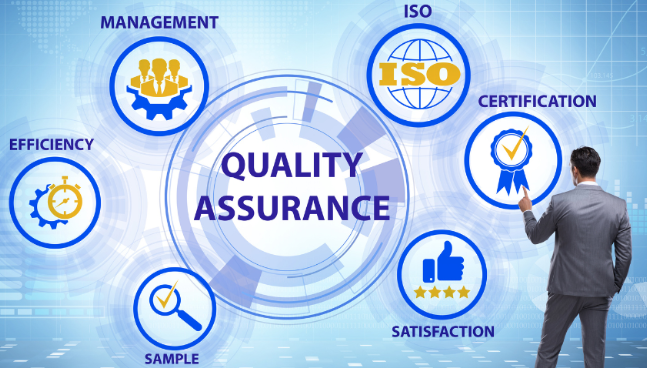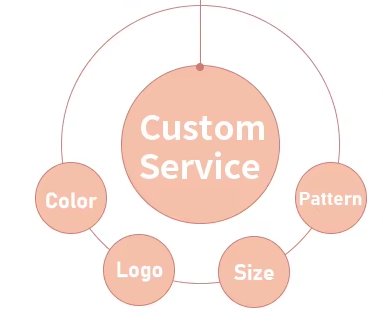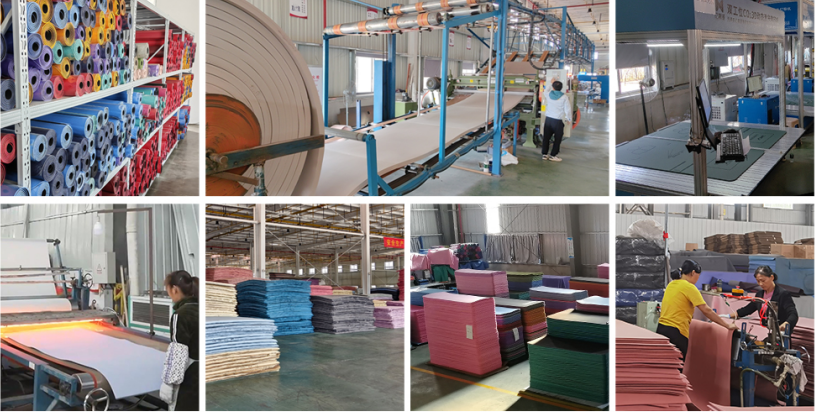I know that trying to find the right yoga mat manufacturer online can feel like a big task. With so many choices out there, how do you make sure you’re picking the best one for your brand? I’m here to help you think through that.

Understanding The Market
Let’s start by looking at the yoga mat market. It’s growing very fast, and many more people want yoga mats. A study even said that by 2025, the global yoga mat market could be worth $1 billion. Because of this growth, I believe it’s really important to choose a manufacturer carefully. You need one that can make enough yoga mats for you and also meets your standards for quality.
The Importance of Quality
For studios, gyms, and yoga brands, I feel that partnering with a good manufacturer is so important. When you have high-quality mats, your customers will be happier, and they’ll likely stick with your brand. I recommend spending a bit more on durable materials that are also kind to the earth. This can really help your brand shine among competitors.
Filtering Manufacturers Online
When you’re looking online, there are many options. I suggest you approach this with a clear plan. I would look for manufacturers who are open about their making process. Also, make sure they have clear certifications for the materials they use.
Based on my experience, making these careful choices will help you get yoga mats that your customers will love. This will also help build a stronger reputation for your brand.
First, I Suggest Defining Your Business Needs
Before you start looking for a yoga mat manufacturer, I suggest you define your business needs. This step will help your search. It will also help you find a supplier that matches your goals.
Quantity and Order Size
Quantity: Will you order in bulk or small batches? I think knowing your order size is important. This way, you can find manufacturers who can handle your order volume.
Customization Options
Customization: Thinking about if you need special features. These could be logo printing, custom colors, or unique packaging. If you know these needs early, it will make choosing a supplier much easier, in my experience.
Type of Mats
Type of Mats: Mats come in different materials. Examples include TPE, natural rubber, cork, nbr or PVC. I suggest you pick a type that fits well with your brand’s values. Also, consider what your target customers prefer.
Required Certifications
Certifications: I think you should find out if you need certain quality certifications. Examples are REACH, SGS, or ISO. This makes sure the materials meet environmental and safety standards. From my perspective, this can also make your brand more trustworthy.
Aligning with Your Brand Vision
Knowing these business needs helps you build a good partnership with a manufacturer. This helps you find one that fits well with your vision and market strategy.
Start with Reliable Online Platforms
To find a good yoga mat manufacturer online, I suggest you start with trustworthy platforms. These platforms can link you to dependable suppliers. I recommend exploring these options:
B2B Marketplaces
I suggest using B2B platforms such as Alibaba, Made-in-China, and Global Sources. From my experience, these platforms offer many manufacturers. You can filter them based on your specific requirements. For example, you can filter by order size, options for customization, and any certifications they hold.

Manufacturer Directories
I also recommend checking out manufacturer directories. Alternatively, you can search on Google. Try using keywords like “OEM yoga mat supplier.” In my view, this approach helps you discover companies. These companies often focus on yoga mats and usually have good reviews from customers.
Social Media Insights
I find LinkedIn useful for getting information about potential manufacturers. I’ve noticed that company pages there often display their skills, what customers say about them, and their certifications. This background helps me get a better sense of how reliable and trustworthy they are.

Evaluate Manufacturer Profiles
I suggest you look closely at potential yoga mat manufacturers. It’s important to check them carefully. Here are some important things I recommend you look at:
Company Experience
How long have they been in business? I suggest you find manufacturers with a good history. From my experience, more experience usually means they are more reliable and produce better quality.
Do they make yoga mats or general fitness products? I recommend choosing one that focuses on yoga mats. This way, they’ll likely understand what makes a good quality mat and what your customers will prefer.
Certifications and Quality Assurance

Check factory photos, certifications, and registered capital if you can. I find this information tells you about how much they can make and if they follow quality rules.
I suggest you also look for certifications like REACH, SGS, or ISO. I believe these show their materials meet environmental and safety rules.
Production Capacity and Pricing
You find out how many mats they can make and their prices. Can they meet your order size? Knowing this helps you see if they can handle your order size and business needs.
Communication and Responsiveness
I suggest you see how they communicate. In my opinion, good communication is very important for working well together.
Understanding Their Production Process
Asking about how they make the mats and what materials they use. Are they open about where they get materials and how they make the mats? I think this is key.
Request Samples & Product Catalogs
When I choose a yoga mat manufacturer, I find it crucial to ask for samples. I do this before I place a big order. This helps me check the quality myself. I focus on several things:
- Material Quality: I check the kind of materials they use in the mats. I want to see if these materials fit my brand’s values. For instance, if my brand values sustainability, I’d look for eco-friendly materials.
- Grip: I ensure the mats provide enough grip. This is important for users of all skill levels. I might even try a quick yoga pose on the sample to test this out.
- Thickness: I look at the thickness. This helps me determine if the mat will be comfortable and offer good support for different yoga practices. From my experience, a thicker mat might be better for gentle yoga, while a thinner one could be preferred for a more active flow.
- Odor: I also check for any bad smells. A strong, chemical-like odor could mean they used low-quality materials. Ideally, I prefer mats that are odor-free or have a very subtle, natural scent.
- Durability: I try to gauge how long the mats might last with normal use. I might lightly scratch the surface or gently stretch it to see how it holds up.
Product Catalogs
Along with samples, I also ask for a product catalog from manufacturers I’m considering. I look for these details in the catalog:
Specifications: I want to see specific details about the mat materials and their features. For example, I look for information on the type of TPE or rubber used, plus the mat’s exact dimensions and weight.
Test Reports: I look for proof of their quality checks. I appreciate seeing reports on safety and how well the mats perform, including any certifications they might have.
With a good product catalog, I find I can decide wisely. It helps me feel more confident that the manufacturer can provide what I need. I always compare my options with great care.
What Customization Can They Do?
When you pick a yoga mat maker, I think it’s important to check what they can customize. Knowing this can make your product more appealing. It also helps it fit your brand’s style.
Ways to Customize
Logo Printing: Asking if they can print your logo on the mats. Your logo is key for people to recognize your brand.
Brand Colors: Do they have choices to match your brand colors? In my experience, this helps keep your brand look the same on all your products.
Packaging Ideas
Private Label Packaging: Asking if they can make custom packaging that shows off your brand. Good-looking packaging makes a big difference in how customers see your product.
More Customization Options
Mold Customization: I suggest you ask if they can customize molds. This could let you create mats with special shapes that get noticed.
Textured Surfaces: You might check if they can make mats with different surfaces (like wave or diamond patterns). From my experience, these features can make the mats work better and feel nicer for users.
Ask About Production & Lead Times
When you look at different Yoga mat manufacturers, it’s very important to ask about their production and lead times. Based on my experience, knowing these timelines can greatly affect your business and your customers’ happiness.

Production Timeframes
Asking about the usual production time for your order size. This way, you’ll know when your mats should be ready. I’ve noticed that manufacturers’ timelines can change. It often depends on their current workload and how much they can produce.
Shipping Times
I suggest you ask about their shipping options and times. You should find out how long delivery will take after they make the mats. This helps me plan my inventory and prevent running out of stock.
Minimum Order Quantities (MOQs)

I always find out if they have minimum order quantities (MOQs). This is very important if you are just starting out or testing a new design. Some yoga mat manufacturers need you to place large orders, and that might not suit what you need right now.
Backup Timelines
Asking about backup plans for production delays. Knowing how they manage delays, for instance, with raw materials, is very important to me. This way, I can give my customers correct information if any problems come up.
When I discuss these key points with potential manufacturers, I can better set expectations. This helps me build a dependable supply system for my yoga mat business.
Expert Opinion:
“I’ve worked a lot with supply chains for fitness companies. From what I’ve seen, production schedules are vital. They can truly make or break your relationships with manufacturers. So, I suggest you add a 20-30% time buffer for your first orders with a new manufacturer. I find many businesses miss something. If you understand Minimum Order Quantities (MOQs) from the start, you can often get better terms. Manufacturers might adjust their minimums. This is more likely if you can promise them regular orders in the future. I believe it’s crucial to have these talks at the very beginning. This way, you avoid finding out about limits when you’re trying to grow your business fast.“
———— Sarah Chen , Supply Chain Director with 12 years experience in fitness equipment procurement and manufacturer partnerships
Verify Certifications and Compliance

It’s a good idea to check if your chosen yoga mat maker follows certifications and rules. This is very important for your brand’s good name. These papers show that the materials and how they make things meet industry standards. This can make your product more attractive to buyers. It also lowers health and safety risks.
Importance of Certifications
I suggest you look for materials certified as non-toxic, good for the environment, and strong. This is important because many people want products that last and are kind to the earth. For instance, certifications such as REACH, SGS, and ISO show that the mat materials meet safety rules and environmental standards.
Requesting Documentation
Asking for proof of these certifications. You should also ask for any third-party test results. This step helps with transparency. It also builds trust with your customers. Showing proof of these certifications makes your brand more trustworthy in a market with many sellers.
Summary
Finding the right yoga mat manufacturer online takes more than a quick search — it requires a strategic and thoughtful process. From identifying your specific product requirements to evaluating certifications, communication quality, and production capabilities, every step helps reduce risk and ensures you get a partner who can support your brand.
If you’re looking for a reliable and experienced manufacturer, Wuhan FDM Eco Fitness Product Co., Ltd is a strong choice. With a solid track record in producing eco-friendly, customizable yoga mats, FDM offers OEM/ODM services, a wide range of materials like TPE and natural rubber, and international certifications like SGS and REACH. Their ability to balance quality, customization, and competitive pricing makes them a preferred partner for many yoga studios, retailers, and wellness brands around the world.
Take your time, ask the right questions, and start with a trustworthy partner like FDM to build a long-term, successful supply relationship.

